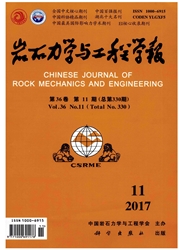

 中文摘要:
中文摘要:
为了减轻使用波特兰水泥作为软土固化剂存在的高能耗、C02排放和不可再生资源消耗等环境问题,通过室内配合比试验初步研究碱激发矿粉对连云港软土的固化效果,并与水泥固化进行对比。结果表明:Na2CO3对矿粉固化土的激发效果非常有限;NaOH激发矿粉的效果最好,7d,28d,90d无侧限抗压强度最高,但是在90d后会发生一定的强度衰减;矿粉+电石渣固化土的7d,28d强度比水泥固化土低,而90d,180d强度比水泥固化土高。Na2CO3,NaOH和Na2S04能够加速矿粉+电石渣固化土的强度增长速率,其中,Na2CO3的效果最弱,虽然可以在90d内提高矿粉+电石渣固化土的强度,但180d强度反而略低;NaOH激发的矿粉+电石渣固化土强度在7d,28d,90d龄期均有较大的提高,但从90d到180d会发生强度衰减;Na2SO3激发矿粉+电石渣的效果最好,可以在实际工程中进行应用,不仅可以减小水泥生产过程带来的环境影响,还能提高软土固化效果,降低工程造价。
 英文摘要:
英文摘要:
In order to mitigate the environmental impacts in terms of high energy consumption, CO2 emissions and no-renewable resources consumption associated with Portland cement(PC) soft soil stabilization, the stabilization effect of alkali-activated ground granulated blast-furnace slag(GGBS) for Lianyugang soft soil was investigated through laboratory test and then it was compared with that of PC. The results show that the NaECO3-activated GGBS had the minimum stabilization efficacy for this soft soil. NaOH-activated GGBS stabilized soil had the highest unconfined compressive strength(UCS) at 7, 28 and 90 days, however its UCS decreased after 90 days. The GGBS-carbide slag stabilized soil had lower 7-day and 28-day UCS than that of PC mix, whilst the former had much higher 90-day and 180-day UCS than the latter. The NaECO3, NaOH and Na2SO4 could accelerate the strength development rate of GGBS-carbide slag stabilized soil. The NaECOa-activated GGBS-carbide slag stabilized soil had only slightly higher 7-day, 28-day, 90-day UCS and lower 180-day UCS than those without NaECO3. NaOH significantly increased the UCS of GGBS-carbide slag stabilized soil at 7, 28 and 90 days. However the UCS decrease was observed from 90 days to 180 days. The Na2SO4 had the highest activating efficacy for GGBS-carbide slag stabilized soil, and thus was suggested to use in practice due to both theeconomical and environmental benefits.
 同期刊论文项目
同期刊论文项目
 同项目期刊论文
同项目期刊论文
 期刊信息
期刊信息
